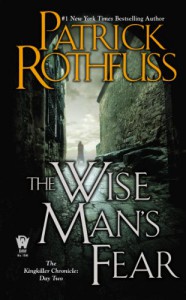Currently reading
The Wise Man's Fear (The Kingkiller Chronicles #2)

How does a man become a myth in his own time, well he does stuff and recounts his adventures to an audience either through stories or songs then lets gossip do it’s thing. The Wise Man’s Fear by Patrick Rothfuss is the second installment of The Kingkiller Chronicles framed around the second day of Kvothe’s recounting of his life with the Chronicler of their agreed upon three-day conversation.
Continuing the narrative where he left off in The Name of the Wind, Kvothe recalls his education at the University and feud with fellow student Ambrose that culminated in Ambrose getting him arrested on charges of Consortation with Demonic Powers, a capital crime, for having called the Name of the Wind. Despite successfully defending himself in court, Kvothe his tuition will be extremely high for the new term tuition due to the negative attention he has attracted to the darker aspects of the University. Kvothe decides to take a term off during which Count Threpe arranges for Kvothe to aid the Maershon Lerand Alveron in Vintas in hopes that Kvothe might earn a writ of patronage. Arriving in the Maer seat in the city of Severen, Kvothe tricks his way into a meeting with the Maer and is contracted to write songs and letters to woo a young noblewoman that the Maer wants to marry. During this shadow courtship, Kvothe saves the Maer’s life by discovering and thwarting a plot to kill the Maer thus earning the nobleman’s respect. After saving his life and helping win his bride, the Maer charges Kvothe to lead a group of mercenaries to hunt bandits that have been waylaying taxmen in The Eld. It takes a month, but the group find and kill the bandits. A few days later they stumble upon the Fae Felurian, Kvothe travels after her, has a lot of sex, is able to use the Name of the Wind to combat her power, and convinces her to let him go but only after speaking to The Cthaeh about his future. Upon his return to the “mortal” world Kvothe learns he endangered the life and career of an Adem warrior by copying and learning the Adem way of fighting. The two travel to Ademre where he earns the right to train and learn the Adem way of life and fighting then earning the right to enter the school for further training if he wanted but in doing so saves his friend’s career. After being given an Adem sword, Caesura, and learning the Adem legend of the Chandrian, Kvothe sets off for Severen once again. On this way he comes across robbers posing as Edema Ruh that kidnapped and were assaulting two young women from a nearby village, Kvothe kills the robbers and returns the two young women to their village then races to the Maer’s court before the news reaches him to present himself, the waylaid taxes, and his deed in person. The Maer’s new wife makes her thoughts on the Edema Ruh clear—utter contempt—to which Kvothe knowledges he is one and his days at court are over. The Maer shows his gratitude by pardoning him for killing the robbers, providing a writ of performance, and ensuring Kvothe’s University tuition is forever compensated. Upon his return to the University, Kvothe and the bursar make a deal so both Kvothe and the University will get money from the Maer’s coffers achieving financial independence for Kvothe. In the present day during pauses in recounting his life, Kvothe and Bast help out the townspeople from around the Waystone Inn before Kvothe is beset by two soldiers prompted by Bast to rob him in an attempt to revitalize his friend but Kvothe loses and waits his apparently soon death while Bast kills the soldiers.
Unlike the first book, this book did not become tedious as Kvothe’s time at the University did not last long and throughout he was doing different things that set up things later in the book. The only time the book became a tad annoying was Kvothe’s sexual adventures with Felurian that was basically read like Rothfuss writing his teenage fantasy. The contemporary scenes at the Waystone Inn did not seem as engaging in this book, but I feel that it was because the flashback narrative was a lot more engaging than the previous book with everything Kvothe was doing.
The Wise Man’s Fear is clearly superior to its predecessor that began paying off things Patrick Rothfuss set up in the initial book. As the final book is taking a while to be written, I don’t feel a rush to know how Kvothe’s story ends but I’d like to read how it ends whenever it comes out.





